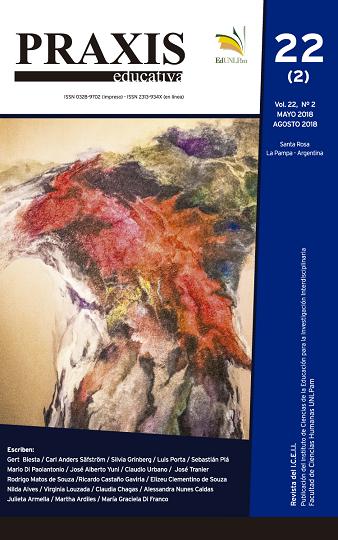Pedagogy of resistance: the denial as a key element of (de)formation
DOI:
https://doi.org/10.19137/praxiseducativa-2018-220209Keywords:
Theodor Adorno, resistance, negativity,Abstract
In this article, the authors propose a reflection on the idea of negativity in a critical and philosophical perspective that can approach in other ways the meanings and purposes of the formation of both the individual and the thought in current times. The denial, or yet, a philosophy of negativity (Adorno, 2009) is presented as a breeding ground for a reconfiguration of the pedagogical ideal and its possibilities to question the anthropological and historical features of what is introduced to us as the truth. The attitude of resistance is, in this text, a key component to the possibility of this philosophy of negativity, which allows us to expand our horizon of thinking and action. The actual intent couldn’t be further from an irrefutable conclusion, quite the contrary. We intend to inspire a provocative debate that destabilizes both the idea of the selfconscious individual and of how they relate with the world. We understand that this is a way to open possibilities to other experiences and narratives about the process of formation and (de)formation in the education.
Downloads
References
Adorno, T. W. (2009). Dialética Negativa. Rio de Janeiro: Zahar.
Adorno, T. W. (2012). Educação e Emancipação. São Paulo: Paz e Terra.
Adorno, T. W. (1996). “Teoria da Semicultura. In: Educação e Sociedade”. Campinas: Papirus, Año VII, Nº 56, 154-168.
Bandeira, B. S & Oliveira, A. R. (2010). “Pedagogia Negativa: uma tentativa de incorporar, à luz do pensamento adorniano, uma concepção estética à educação”. Anais do VIIIº Encontro de Pesquisa em Educação da Região Sul – ANPEDSUL.
Londrina: Universidade Estadual de Londrina. Disponível em http://www.portalanpedsul.com. br/admin/uploads/2010/Filosofia_e_Educacao/
Trabalho/02_51_30_Pedagogia negativa,una tentaiva de incorporar, a luz,dopensamiento adorniano, uma concepcao estetica a educacao. PDF.Acessoem 01/10/2014
Benjamin, W. (1994). Obras Escolhidas: Magia e Técnica, Arte e Política. Rio de Janeiro: Zahar.
Biesta, G. y Säfström, C.A. (2011). A Manifiesto for Education. Policy Futures in Education Año. 9 Nº 5, pp.540-547
Cusicanqui, S. R. (2010). Violencias (Re)cubiertas en Bolivia. La Paz: Editorial Piedra Rota; Editorial La Mirada Salvaje
De Certeau, M. (1998). A Invenção do Cotidiano. Artes de Fazer. Petrópolis: Vozes.
Fabre, M. (2011). Experiencia y Formación: la Bildung, traducción del francés por Alejandro Rendón Valencia. In: Revista Educación y Pedagogia. Medellín,
Universidad de Antioquia, Facultad de Educación, Vol. 23, nº 59, pp. 215-225.
Flusser, V.(2011). A Dúvida. São Paulo: Annablume.
Han, B-C. (2013). La sociedad de la transparencia. Barcelona: Herder.
Mèlich, J-C. (2004). La lección de Auschwitz. Barcelona: Herder.
Nietzsche, F. (1998). Para além de bem e mal. Lisboa: Guimarães Editores.
Pucci, B. (2014). Filosofia Negativa e Educação: Adorno. Disponível em: http://www.unimep.br/~bpucci/ filosofia-negativa-e-educacao-adorno.pdf.
San Martín, J. (2013) Antropología filosófica I: De la Antropología científica a la filosófica.Madrid: Grado.
Schöpke, R. (2004). Por uma filosofía da duferença: Gilles Deleuze, o pensador nómade. São Paulo: Edusp; Rio de Janeiro: contraponto.
Silva, F. L. (2014). Universidade, Cidade, Cidadania. São Souza, R. M. (2012). Rizoma Deleuze-Guattariano: representação, conceito e algumas aproximações com a Educação. In: Revista Sul-Americana de Filosofia e Educação. Número 18, maio-out, pp. 234-259. Disponível em http://periodicos.unb.br/index.php/resafe/article/viewFile/7047/5569.
Souza, R. M. (2016a). As Lições do Lager: experiências com o mal e (de)formação nas narrativas de Lanzmann e Semprun. In: Moraes, D. Z; Cordeiro, V. M. R; Oliveira, O. V. Narrativas Digitais, História, Literatura e Artes na Pesquisa (Auto)Biográfica. Curitiba:Editora CRV.
Souza, R.M y Souza, E. C. (2016b). A (De)Formação pela escola: representações de processos formativos na Trilogia Autobiográfica de Elias Canetti. In: Revista Brasileira de Pesquisa (Auto)Biográfica, Salvador, vol. 1, n. 2, pp. 236-253.
Zemelman, H. (2012) Los horizontes de la razón. I. Dialéctica y apropiación del presente. Madrid: Anthrop
Downloads
Published
Issue
Section
License
Copyright Notice
Editorial Committee Educational Praxis Magazine:
I hereby declare that I am the author of the article titled (article name), that it is original and my own and that it was not previously published in any other format or medium. I declare to know that the magazine will not charge me any type of fee under any circumstances, nor will I receive any type of monetary compensation If it were accepted for publication in Educational Praxis, I authorize the aforementioned magazine to publish it digitally and to advertise it on its social networks.
If the work is published, I adhere to the Creative Commons license called "Attribution - Non-Commercial Share Alike CC BY-NC-SA", through which it is allowed to copy, reproduce, distribute, publicly communicate the work and generate derivative works, as long as when the original author is cited and acknowledged. This license has been used since September 2018. In 2016 CC BY NC ND 4.0 was adhered to; and in the years 2017 and 2018 (January-August) CC BY NC 4.0.
This CC BY-NC-SA Share Alike license does not, however, permit commercial use of the work. As an author, the journal may establish additional agreements for the non-exclusive distribution of the version of the work published in the journal, it allows me to self-archive the published articles, in their post-print version, in institutional, thematic repositories, personal web pages or any other relevant use. with the recognition of having been first published in this journal.
Educational Praxis adheres to DORA (Declaration on Research Assessment) signed in San Francisco, California, on December 16, 2012, and to the Declaration of Mexico (Joint Declaration LATINDEX - REDALYC - CLACSO - IBICT).















_(1)2.png)


3.png)











_(2).png)






2.jpg)









